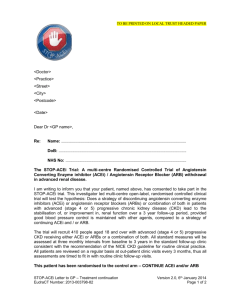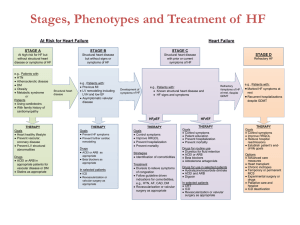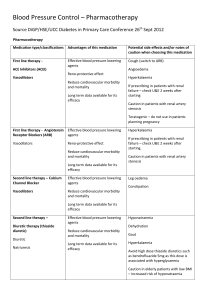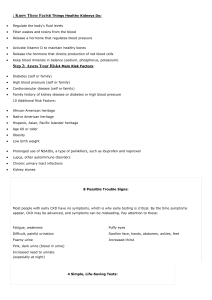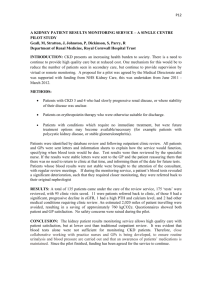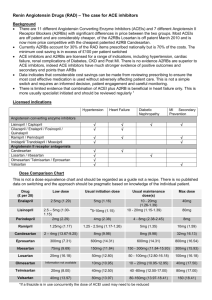PATIENT INFORMATION SHEET - University of Birmingham
advertisement
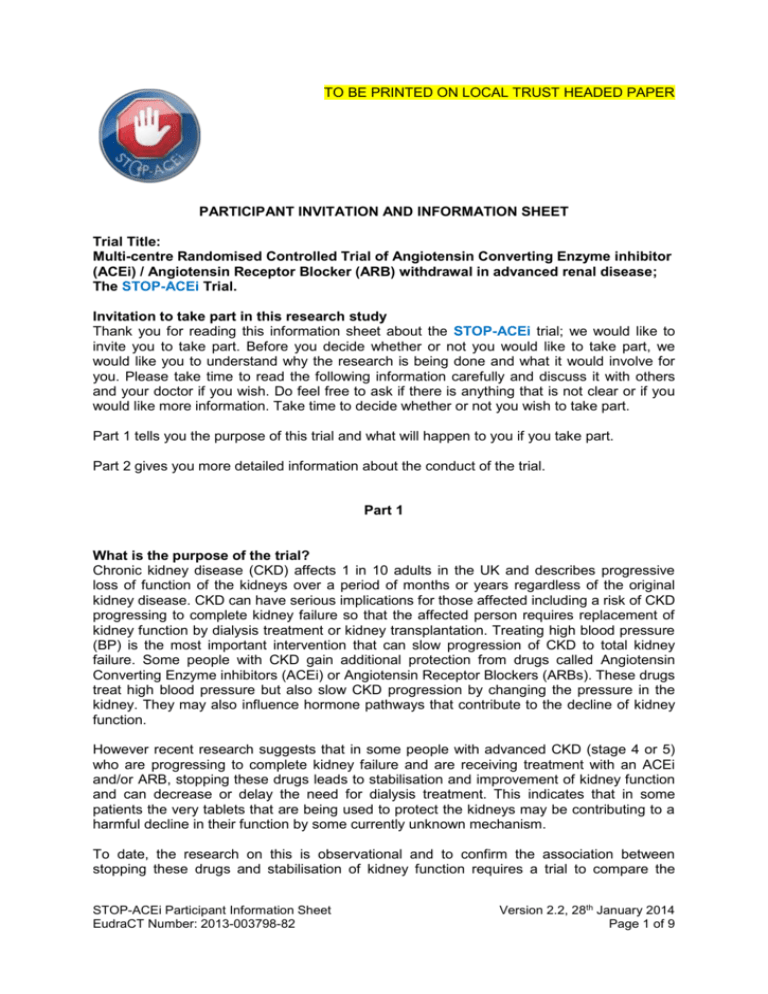
TO BE PRINTED ON LOCAL TRUST HEADED PAPER PARTICIPANT INVITATION AND INFORMATION SHEET Trial Title: Multi-centre Randomised Controlled Trial of Angiotensin Converting Enzyme inhibitor (ACEi) / Angiotensin Receptor Blocker (ARB) withdrawal in advanced renal disease; The STOP-ACEi Trial. Invitation to take part in this research study Thank you for reading this information sheet about the STOP-ACEi trial; we would like to invite you to take part. Before you decide whether or not you would like to take part, we would like you to understand why the research is being done and what it would involve for you. Please take time to read the following information carefully and discuss it with others and your doctor if you wish. Do feel free to ask if there is anything that is not clear or if you would like more information. Take time to decide whether or not you wish to take part. Part 1 tells you the purpose of this trial and what will happen to you if you take part. Part 2 gives you more detailed information about the conduct of the trial. Part 1 What is the purpose of the trial? Chronic kidney disease (CKD) affects 1 in 10 adults in the UK and describes progressive loss of function of the kidneys over a period of months or years regardless of the original kidney disease. CKD can have serious implications for those affected including a risk of CKD progressing to complete kidney failure so that the affected person requires replacement of kidney function by dialysis treatment or kidney transplantation. Treating high blood pressure (BP) is the most important intervention that can slow progression of CKD to total kidney failure. Some people with CKD gain additional protection from drugs called Angiotensin Converting Enzyme inhibitors (ACEi) or Angiotensin Receptor Blockers (ARBs). These drugs treat high blood pressure but also slow CKD progression by changing the pressure in the kidney. They may also influence hormone pathways that contribute to the decline of kidney function. However recent research suggests that in some people with advanced CKD (stage 4 or 5) who are progressing to complete kidney failure and are receiving treatment with an ACEi and/or ARB, stopping these drugs leads to stabilisation and improvement of kidney function and can decrease or delay the need for dialysis treatment. This indicates that in some patients the very tablets that are being used to protect the kidneys may be contributing to a harmful decline in their function by some currently unknown mechanism. To date, the research on this is observational and to confirm the association between stopping these drugs and stabilisation of kidney function requires a trial to compare the STOP-ACEi Participant Information Sheet EudraCT Number: 2013-003798-82 Version 2.2, 28th January 2014 Page 1 of 9 outcomes of a group of people who have had these drugs stopped with a group who continue on the drug. This is called a randomised controlled trial (RCT). In the STOP-ACEi trial, we will recruit 410 patients with CKD stage 4 or 5 who are receiving treatment with ACEi and/or ARBs and randomly allocate half of the suitable participants to continue their ACEi/ARB treatment and the other half to stop their ACEi/ARB treatment. A computer generated random list will decide whether you continue or stop your treatment – a bit like tossing a coin. This is to make it the best possible test of whether it is better to continue or stop treatment with ACEi and/or ARBs in patients with CKD stage 4 or 5. All participants will be followed-up for 3 years. In addition we will look at other effects of stopping these drugs such as effects on the heart and participant quality of life. This study is needed before this treatment strategy can be put into routine clinical practice. Why have I been invited? You are under the care of kidney specialists who are treating your CKD. You have stage 4 or 5 CKD, which is the stage of CKD we are investigating. You are aged 18 years or over and are receiving treatment with either an ACEi or ARB, or combination or both. We are asking 410 patients with advanced kidney disease in hospitals across the UK to take part. Do I have to take part? No, taking part in the research is entirely voluntary. It is up to you and your decision will not affect the standard of care you receive. If you do decide to take part, you will be given this information sheet to keep and be asked to sign a consent form. If you decide to take part, you are still free to withdraw at any time and without giving a reason. This will not affect the standard of care you receive. If you do not take part or you withdraw from the trial, you will receive your consultant’s usual treatment for your CKD. What will happen to me if I take part? At your next clinic appointment you will be seen by your kidney doctor. If you are willing to take part in the STOP-ACEi trial you will be asked to sign a separate consent form. The research nurse will go through an information form with you to check your details and ask about your medications and other illnesses you may have or may have had. You will be asked to give your ethnic origin, date of birth, cause of CKD, smoking status, alcohol intake, and your height and weight (to calculate body mass index (BMI)) and blood pressure will be measured. You will have your usual blood and urine samples taken for tests of kidney function. The tests on your blood and urine samples will include: estimated glomerular filtration rate (eGFR), biochemical profile (BCP), full blood count (FBC), C reactive protein (CRP) and protein:creatinine ratio (PCR). These samples will be analysed locally according to the normal practice at your hospital. In addition, as part of the trial, we will also use the blood samples collected to test for cystatin-C, N Terminal Pro B-Type natriuretic peptide (NTproBNP), and ACE and renin levels. These samples will initially be stored at your treating hospital and will then be sent to a central lab at Hull and East Yorkshire Hospitals NHS Trust for analysis. Some samples may also be analysed at the University of Hull. We would also like to store some of the blood and urine samples that you give at the initial assessment and at one and three years for analysis of biomarkers (new tests currently not available) in the future. This is optional; you will be asked to state if you agree, or not, for your samples to be used for this purpose on the Participant Consent Form. If you did agree to your samples being used, stored and analysed for biomarkers, the samples will be transported from your local hospital and analysed at Hull and East Yorkshire Hospitals NHS Trust. STOP-ACEi Participant Information Sheet EudraCT Number: 2013-003798-82 Version 2.2, 28th January 2014 Page 2 of 9 The total amount of blood taken overall for the samples at each visit will be 30 mL (approximately 6 teaspoons). This is a normal volume of blood taken for a blood sample. You will be asked to take part in a 6–minute walk test at the initial assessment and at each annual assessment, to measure your physical function and exercise tolerance. This involves walking for 6 minutes up and down a 20 metre long level corridor as quickly as possible. Your performance is assessed by the total distance walked. A 12 lead electrocardiogram (ECG) will be performed at the initial assessment and at each annual assessment so that your heart can be monitored. An ECG is a simple, painless test that records the heart's electrical activity. You will be asked to complete a kidney disease-specific quality of life (QOL) questionnaire at the initial assessment and at each annual assessment. These will be given to you to fill in at the beginning of the trial and then at each year for three years, so you will have four questionnaires to fill in altogether. They normally take between 15-30 minutes to complete. We would like to record data from any echocardiograms that are performed as part of your normal clinical care from one year before you enter the trial until the end of your participation in the trial. An echocardiogram – also known as an echo – is a non-invasive x-ray like test which uses sound waves to build up a detailed picture of your heart. It is similar to the ultrasound scan used in pregnancy. No additional echocardiograms will be performed for trial purposes. You will be provided with a participant diary and asked to complete this and bring it with you to the regular check-ups with your doctor. In your participant diary we ask you to record whether you have been unwell in any way, and record any visits to your GP or hospital, along with any change in the medication that you are taking. Information from the diary that you complete will be recorded in your medical record and on the trial assessment forms during the trial follow-up visits. All participants will be followed up in clinic every 3 months for 3 years to assess their progress. These follow up appointments will coincide with your usual regular clinic appointments. At each assessment you will have your blood pressure measured, any changes in medication will be noted, routine blood and urine samples will be taken, a check of compliance with the treatment allocated and a check if you have experienced any adverse events, such as needing to see a doctor or nurse or experiencing any side effects, will be completed. Annually, your weight will be measured to calculate BMI, additional blood tests will be done for cystatin C, NT-proBNP, ACE and renin levels, and you will complete the QOL questionnaire, 6 minute walk test and have a 12 lead ECG. You will also be telephoned by the research nurse or study doctor between the first and second visits (4-6 weeks after starting in the trial) to check if you have had any medication changes and to assess your progress. The table below shows exactly which tests will be carried out at each assessment over the three year trial period. STOP-ACEi Participant Information Sheet EudraCT Number: 2013-003798-82 Version 2.2, 28th January 2014 Page 3 of 9 Visit/month 1 Initial visit Phone call Trial visit number 2 3 4 5 6 7 8 9 10 11 12 13 3 6 9 12 15 18 21 24 27 30 33 36 Informed consent Y Randomisation and trial number allocation Y Date of birth, gender and ethnic origin Y Medical history Y Cause of CKD Y Smoking status Y Alcohol intake Y Height Y Weight Y Y Y Y BMI Y Y Y Y Blood pressure Y Medication check Y Record data from cardiac echo if performed Y Y Y Y Y Y Y Y Y Y Y Y Y Y Y Y Y Y Y Y Y Y Y Y Y Y Y Y Y Y Y Y Y Y Y Y Y Check of compliance with the trial treatment allocation Y Y Y Y Y Y Y Y Y Y Y Y Y Check for any adverse events Y Y Y Y Y Y Y Y Y Y Y Y Y Routine blood tests for FBC, BCP, eGFR and CRP Y Y Y Y Y Y Y Y Y Y Y Y Y Routine urine test for PCR Y Y Y Y Y Y Y Y Y Y Y Y Y Y Y Additional tests for the trial Six minute walk test Y Y Y Y QoL questionnaire Y Y Y Y 12 Lead ECG Y Y Y Y Blood test for Cystatin C, NT-proBNP and ACE and renin levels Y Y Y Y Serum and urine samples for biomarker analysis (optional) Y Y STOP-ACEi Participant Information Sheet EudraCT Number: 2013-003798-82 Y Version 2.2, 28th January 2014 Page 4 of 9 What is the drug or procedure that is being tested? Stopping ACEi/ARB treatment is being compared to continuing ACEi/ARB treatment. The following list shows the names of the ACEi and ARB drugs: ARBs: Candesartan, Irbesartan, Telmisartan, Eprosartan, Losartan, Olmesartan, Valsartan and Azilsartan ACEi: Lisinopril, Enalapril Maleate, Ramipril, Captopril, Cilazopril, Fosinopril Sodium, Moexipril Hydrochloride, Perindopril Erbumine, Perindopril Arginine, Quinapril, Trandolapril and Imidapril Hydrochloride What are the alternative treatments available? The current trial is designed to see whether stopping ACEi/ARB treatment is better than continuing to take ACEi/ARB treatment. Continuation of ACEi/ARB treatment is currently standard care in patients with CKD stage 4 or 5. What are the side effects of the treatment? The current trial is designed to see whether stopping ACEi/ARB treatment is better than continuing to take ACEi/ARB treatment. If you stop your ACEi/ARB medication, the possible side effects are minimal but may include: a rise in your blood pressure (hypertension) which may require alternative medication, a reduction in blood potassium concentrations (hypokalaemia) which is unlikely to cause symptoms or require intervention, a possible increase in gout for those patients on losartan. There may also be an increase in swelling of the ankles (peripheral oedema) and change in urinary protein when measured, which will not cause symptoms, and weight gain. You may experience other side effects which may relate to a rise in blood pressure if the rise in blood pressure is significant. It may also be that several current symptoms you have may resolve on stopping ACEi and ARB medication. These may include improvement in skin rashes, dizziness, altered taste sensation, headaches, dry cough, sinusitis, rhinitis (runny nose), dyspepsia (heart burn), diarrhoea or constipation and muscle aches. If you stop your ACEi/ARB treatment your doctor may choose one of a selection of medications to treat your blood pressure, if required. Clinic blood pressure (taken from an average of three readings) will be recorded at each visit (home readings are acceptable). All medication, including blood pressure medication, can have side effects which your doctor will inform you of, but at all times your doctor will aim to minimise these as far as possible. Your doctor will aim to get your blood pressure to a standard blood pressure target of less than or equal to (≤) 140/85mmHg. What are the possible disadvantages and risks of taking part? The current trial is designed to see whether stopping ACEi/ARB treatment in participants with CKD stage 4 or 5 is better than continuing to take ACEi/ARB treatment. Stopping ACEi/ARB treatment Stopping ACEi/ARB treatment may lead to a rise in blood pressure. However your blood pressure will be controlled using alternative medication, as your doctor decides in consultation with you. Your doctor will aim to get your blood pressure to a standard blood pressure target of ≤140/85mmHg. The target blood pressure of ≤140/85 mmHg will be based on what your doctor can achieve and what you and your doctor find acceptable. There is currently very little data to show whether or not stopping ACEi/ARB could increase the rate of heart problems. No increased heart problems have been noted in a previous small trial where patients stopped their ACEi/ARB treatment. However, the STOP-ACEi Participant Information Sheet EudraCT Number: 2013-003798-82 Version 2.2, 28th January 2014 Page 5 of 9 potential risk of increased heart problems for participants will be carefully assessed throughout the trial. Continuing ACEi/ARB treatment At present we do not know whether continuing ACEi/ARBs is beneficial, but it is thought by some that they may maintain kidney function while by others it may not, and may worsen it. The evidence available is inconclusive. It is thought that ACEi/ARB medication may also be beneficial for the heart but again this is unknown in patients with advanced kidney disease such as yourself. A recent large analysis comparing ACEi/ARB to other blood pressure medication did not show any difference in effects on the heart. Therefore it is not known if ACEi/ARB provide any additional benefit to patients with advanced CKD. If you continue to take your ACEi/ARB treatment your doctor may decide to continue with or change the dose and/or type of ACEi/ARB treatment you are taking in addition to continuing with or changing any additional blood pressure medications you may be taking. If your blood pressure requires further treatment, your doctor may start you on one of a number of medications. There are many blood pressure medications which your doctor may choose to start and this will be left to your doctor to decide in consultation with you. Your doctor will aim to get your blood pressure to a standard blood pressure target of ≤140/85mmHg. The target blood pressure of ≤140/85 mmHg will be based on what your doctor can achieve and you and your doctor find acceptable. All trial participants The trial will be overseen by a Data Monitoring and Ethics Committee (DMEC). The DMEC is an independent group of experts who monitor participant safety while a clinical trial is ongoing to make sure that participants are not exposed to inappropriate risks. In practice, some doctors stop ACEi/ARB treatment in patients with advanced CKD but others do not. It is important for care of patients that this trial provides reliable evidence to guide future patient care. What are the possible benefits of taking part? Participants in research studies such as this receive very close monitoring, which will be advantageous to your general health. Although you may not receive any individual benefit from taking part in the trial, the information we get from the trial may help us to improve the treatment of all people in the UK with stage 4 or 5 CKD in the future. Will I be paid for taking part in the trial? No, there will be no payments for participating in the trial. What happens when the research trial stops? When the trial stops, the results of the trial will be published and the information we get from the trial may help us to improve the treatment of people with stage 4 or 5 CKD in the future. You will be given a copy of the trial report if you wish. What if there is a problem? Any complaint about the way you have been dealt with during this trial or any possible harm you might suffer will be addressed. The detailed information is given in Part 2. Will my taking part in the trial be kept confidential? Yes. We will follow ethical and legal practice and all information about you will be handled in confidence. The detailed information is given in Part 2. Thank you for reading so far – if you are still interested, please go to Part 2 STOP-ACEi Participant Information Sheet EudraCT Number: 2013-003798-82 Version 2.2, 28th January 2014 Page 6 of 9 Part 2 What if relevant new information becomes available? Sometimes during the course of a trial, new information becomes available about the treatment that is being studied. If this happens, your trial doctor will discuss how this affects your care and participation in the STOP-ACEi trial. Your research doctor will tell you about the new information and discuss with you whether you want to continue in the trial. If you decide to withdraw, your research doctor will make arrangements for your care to continue. If you decide you wish to continue in the trial, you may be asked to sign an updated consent form. Your research doctor may also discontinue you from the trial if your safety is compromised at any time. If the trial is stopped for any reason, your doctor would, again, tell you and arrange for your continuing care. What will happen if I do not want to carry on with the trial? You can decide not to continue with the trial at any time but, if you do, we would still like to follow-up your progress and your data would remain on file and be included in the final trial analysis, unless you request that they should not be. What if there is a problem? If you are harmed due to someone’s negligence, then you may have grounds for legal action, but may have to pay for it. Regardless of this, if you wish to complain, or have any concerns about any aspect of the way you have been approached or treated during the course of this trial, the normal National Health Service complaints mechanisms should be available to you. Taking part in this trial would not affect your legal rights. If you have a concern about any aspect of this trial, you should ask to speak to the researchers who will do their best to answer your questions. The contact details for the STOP-ACEi Chief Investigator are: Prof Sunil Bhandari, Telephone 01482 674566. If you remain unhappy and wish to complain formally, you can do this through the NHS Complaints Procedure. Details can be obtained from the hospital. Will my taking part in the trial be kept confidential? If you decide to take part in the STOP-ACEi trial, all information which is collected about you during the course of the research will be kept strictly confidential in the same way as your medical records. Information about your disease and progress will be sent by your doctors to the STOP-ACEi trial office at the University of Birmingham Clinical Trials Unit (BCTU), on paper and electronically, where it will be securely stored under the provisions of the 1998 Data Protection Act. If you consent to taking part in this trial, your general practitioner (GP) and the other doctors involved in your clinical care will be notified of your participation in the STOP-ACEi trial and kept informed of your progress. With your permission, your relevant medical records may also be inspected by authorised individuals from the BCTU or your hospital. They may also be looked at by the trial team and regulatory authorities. If you consent to taking part in this trial a copy of the consent form will be faxed to BCTU. The purpose of this is to check that the trial is being carried out correctly. If you consent, the research staff involved in STOP-ACEi may, in the future, access electronic data from your central NHS records, for example through the Health and Social Care Information Centre (HSCIC). This will provide researchers with information that is routinely gathered and stored during your visits to primary care and hospital, and will allow researchers to find out about your health after the trial has ended and the long-term effects of the treatments. By using routinely collected data we will be able to do this without needing STOP-ACEi Participant Information Sheet EudraCT Number: 2013-003798-82 Version 2.2, 28th January 2014 Page 7 of 9 to contact you further. In order to do this, we would need to send your name, gender, date of birth and NHS number with any request for information. We would store this personal data on a secure, password-controlled database with access given to only a small number of delegated study staff. This information will be strictly confidential and all medical details will be anonymised to everyone except the core staff involved in this study. All will have a duty of confidentiality to you as a research participant and will do their best to meet this duty. In line with clinical trial guidelines, at the end of the trial, the data will need to be securely archived (stored) for at least 5 years. Arrangements for confidential destruction will then be made. Should you withdraw consent for your data to be used, it will be confidentially destroyed immediately. What will happen to the blood/urine samples I give? The blood and urine samples will, where possible, be collected at a time when you are having a blood/urine test performed for routine clinical purposes. The blood and urine samples you give for analysis of eGFR, BCP, FBC, CRP and PCR will be analysed in the laboratory at the hospital in which you have been seen. In addition, as part of the trial, we will also use the blood samples collected to test for cystatin-C, NT-proBNP, and ACE and renin levels. These samples will initially be stored at your treating hospital and will then be sent to a central lab at Hull and East Yorkshire Hospitals NHS Trust for analysis. Some samples may also be analysed at Hull University. If you agree, the blood and urine samples collected at 1 and 3 years will initially be stored in the laboratory at the hospital in which you have been seen and then transported to Hull and East Yorkshire Hospitals NHS Trust at the end of the trial. Samples stored at Hull and East Yorkshire Hospitals NHS Trust will be analysed for new kidney biomarkers that become available during the period of the trial (provided that you have given your consent for this purpose). No DNA (genetic) studies will be done on your samples. Your samples will be stored for analysis for up to a year following the end of the trial, they would then be destroyed unless ethical approval is given for their continued storage and use in further research projects. What will happen to the results of the research trial? Once the trial has finished, the results from all participants who took part in the trial will be published in a scientific journal. The publication will appear when all the participants have completed the trial and the results have been analysed. Your doctor can provide you with a copy of this publication if you are interested. We will also publicise the results on the trial’s website. Only anonymous data will be published and your name will not appear in any report, presentation or publication. Who is organising and funding the research? The STOP-ACEi trial is being co-ordinated by the BCTU at the University of Birmingham and is sponsored by the Hull and East Yorkshire Hospitals NHS Trust. The trial Chief Investigator is Professor Sunil Bhandari at Hull Royal Infirmary. The trial is being funded by the National Institute for Health Research (NIHR) and the Medical Research Council (MRC) through the Efficacy and Mechanism Evaluation (EME) Programme. The research has been reviewed and approved by all these organisations. Your doctor will not be paid for including you in this trial. Who has reviewed the trial? All research in the NHS is looked at by an independent group of people called a Research Ethics Committee to protect your safety, rights, wellbeing and dignity. This trial has been reviewed and given favourable opinion by the Yorkshire and The Humber (Leeds East) Research Ethics Committee (Ref: 13/YH/0394). Research Ethics Committees include STOP-ACEi Participant Information Sheet EudraCT Number: 2013-003798-82 Version 2.2, 28th January 2014 Page 8 of 9 healthcare professionals as well as non-medical people, and are completely independent from anyone organising the trial. Further details about the National Research Ethics Service can be found at: http://www.nres.nhs.uk/about-the-national-research-ethics-service/. This trial has also been reviewed and approved by the Medicines and Healthcare products Regulatory Agency (MHRA). Where can I get further information? For queries about the trial or for further information please contact: <Insert local PI name>, Telephone <insert local PI contact details>, STOP-ACEi Principal Local Investigator Professor Sunil Bhandari, Telephone: 01482 674566, STOP-ACEi Chief Investigator The STOP-ACEi trial co-ordinating centre is located at the Birmingham Clinical Trials Unit, College of Medical & Dental Sciences, Robert Aitken Institute, University of Birmingham, Edgbaston, Birmingham B15 2TT. Tel 0121 415 9130, Fax: 0121 415 9135, Web address: www.birmingham.ac.uk/stopacei. Email: stopacei@trials.bham.ac.uk Thank you for considering participation in this trial. You will be given a copy of this information sheet and your signed consent form to keep if you decide that you wish to take part in the trial. STOP-ACEi Participant Information Sheet EudraCT Number: 2013-003798-82 Version 2.2, 28th January 2014 Page 9 of 9
